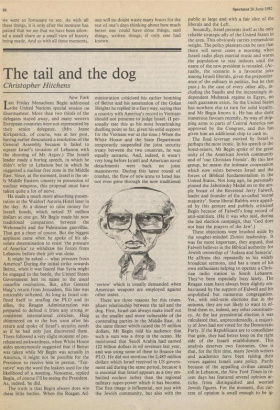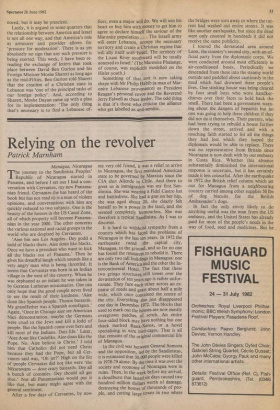The tail and the dog
Christopher Hitchens
New York T ast Friday Menachem Begin addressed 1-ithe United Nations special session on disarmament. More than two thirds of the delegates stayed away, and many western European countries were not represented by their senior delegates. (Mrs Jeane Kirkpatrick, of course, was at her post, having earlier denounced a resolution of the General Assembly because it failed to equate Israel's invasion of Lebanon with the shooting of Mr Argov.) The Israeli leader made a boring speech, in which he didn't refer to Lebanon but in which he suggested a nuclear-free zone in the Middle East. Since, at the moment, Israel is the on- ly Middle Eastern country in possession of nuclear weapons, this proposal must have taken quite a lot of nerve.
He made a much more absorbing presen- tation at the Waldorf Astoria Hotel later in the day. At a dinner to raise money for Israeli bonds, which netted 35 million dollars at one go, Mr Begin made his now traditional comparison between the Wehrmacht and the Palestinian guerrillas. That got a cheer of course. But the biggest applause came when he spoke of his ab- solute determination to resist 'the pressure of America' to withdraw his forces from Lebanon before their job was done.
It might be asked — what pressure from America? During the initial strike towards Beirut, when it was feared that Syria might be engaged in the battle, the United States Government lent its name to the usual ceasefire resolutions. But, after General Haig's return from Jerusalem, this line was noticeably softened. As long as Israel con- fined itself to strafing the PLO and its allies, the Reagan Administration was prepared to defend it from any strong or consistent international criticism. Haig shimmered on to the box soon after his return and spoke of Israel's security needs as if he had only just discovered them. There followed a very slight moment of pre- rehearsed awkwardness, when White House aides anonymously suggested that if Beirut was taken while Mr Begin was actually in America, it might not be possible for the President to receive him in person. 'Ten- tative' was the word the leakers used for the likelihood of a meeting. Nonsense, replied Begin, of course I'll be seeing the President. As, indeed, he did.
The truth is that Begin always does win these little battles. When the Reagan Ad-
ministration criticised his earlier bombing of Beirut and his annexation of the Golan Heights he replied in a fiery way, saying that a country with America's record in Vietnam should not presume to judge Israel. (I per- sonally rate this as his most breathtaking duelling point so far, given his solid support for the Vietnam war at the time.) When the White House and the State Department temporarily suspended the joint security treaty between the two countries, he was equally sarcastic. And, indeed, it wasn't very long before Israeli and American naval detachments were back on joint manoeuvres. During this latest round of combat, the flow of new arms to Israel has not even gone through the now traditional 'review' which is usually demanded when American weapons are employed against other states.
There are three reasons for this trium- phant relationship between the tail and the dog. First, Israel can always make itself out as the smaller and more vulnerable of the contending parties in the Middle East. At the same dinner which raised the 35 million dollars, Mr Begin told his audience that such a sum was a drop in the ocean. He mentioned that Saudi Arabia had earned 122 billion dollars in oil revenues last year, and was using some of these to finance the PLO. He did not mention the 2,485 million dollars which Israel received in US govern- ment aid during the same period, because it is essential that Israel appears as a tiny em- battled enclave rather than the regional military super-power which it has become. The first image is influential, not just with the Jewish community, but also with the public at large and with a fair slice of the liberals and the Left.
Secondly, Israel presents itself as the only reliable strategic ally of the United States in the area. This obviously carries tremendous weight. The policy planners can be sure that there will never come a morning when Israeli radio plays martial music and warns the population to stay indoors until the name of the new president is revealed. (Ac- tually, the scenario is a favourite joke among Israeli liberals, given the preponder- ance of the military in politics, but let that pass.) In the case of every other ally, in- cluding the Saudis and the increasingly in- dependent Mubarak regime in Egypt, no such guarantee exists. So the United States has nowhere else to turn for solid loyalty, and Mr Begin knows it. He has also done numerous favours recently, by way of ship- ping arms to parts of Central America not approved by the Congress, and this has given him an additional chip to cash in.
The final leverage exerted by Israel is perhaps the most ironic. In his speech to the bond-raisers, Mr Begin spoke of the great unity of the American Jewish community and of 'our Christian friends'. By this last group, he meant the intimate cooperation which now exists between Israel and the forces of Biblical fundamentalism in the United States. Not long ago, he personally pinned the Jabotinsky Medal on to the am- ple breast of the Reverend Jerry Falwell, leader and founder of the so-called 'moral majority'. Some liberal Rabbis were appall- ed by this gesture and publicly criticised Begin because of Falwell's long record of anti-semitism. (He it was who said, during the last election campaign, that 'God does not hear the prayers of the Jew'.) These objections were brushed aside by the tougher-minded Zionist leadership. It was far more important, they argued, that Falwell believes in the Biblical authority for Jewish ownership of 'Judaea and Samaria'. He affirms this repeatedly in his widely broadcast sermons, and has a team of his own enthusiasts helping to operate a Chris- tian radio station in South Lebanon. They've been especially busy lately. The Reagan team have always been slightly em- barrassed by the support of Falwell and his unpolished but numerous congregation. Yet, with mid-term elections due in the autumn, they are not likely to want to of- fend them or, indeed, any other constituen- cy. At the last presidential election it was calculated that, unprecedentedly, a majori- ty of Jews had not voted for the Democratic Party. If the Republicans are to consolidate that gain, they had better keep on the right side of the Israeli establishment. This analysis deserves two footnotes. One is that, for the first time, many Jewish writers and academics have been raising their voices against Israeli state policy. Partly because of the appalling civilian casualty toll in Lebanon, the New York Times in re- cent days has featured several opinion ar- ticles from distinguished and worried Jewish figures. For the moment, this cur- rent of opinion is small enough to be ig-
nored, but it may be prescient.
Lastly, it is argued in some quarters that the relationship between America and Israel is not all one way, and that America's role as armourer and provider allows for 'pressure for moderation'. There is as yet absolutely no sign that any such pressure is being exerted. This week, I have been re- reading the exchange of letters that took place between David Ben Gurion and his Foreign Minister Moshe Sharett as long ago as the mid-Fifties. Ben Gurion told Sharett that the creation of a Christian state in Lebanon was 'one of the principal tasks of our foreign policy'. And, according to Sharett, Moshe Dayan came up with a plan for its implementation: 'The only thing that's necessary is to find a Lebanese of- ficer, even a major will do. We will win his heart or buy him with money to get him to agree to declare himself the saviour of the Maronite population . . . The Israeli army will enter Lebanon, occupy the necessary territory and create a Christian regime that will ally itself with Israel. The territory of the Litani River southward will be totally annexed to Israel.' (The Maronite Phalange, of course, was explicitly modelled on the Hitler youth.) Something of that sort is now taking shape with Mr Philip Habib (a man of Mar- onite Lebanese provenance) as President Reagan's personal envoy and the Reverend Jerry Falwell as cheer leader. The odd thing is that it's those who criticise the alliance who get labelled as anti-Semitic.























































 Previous page
Previous page